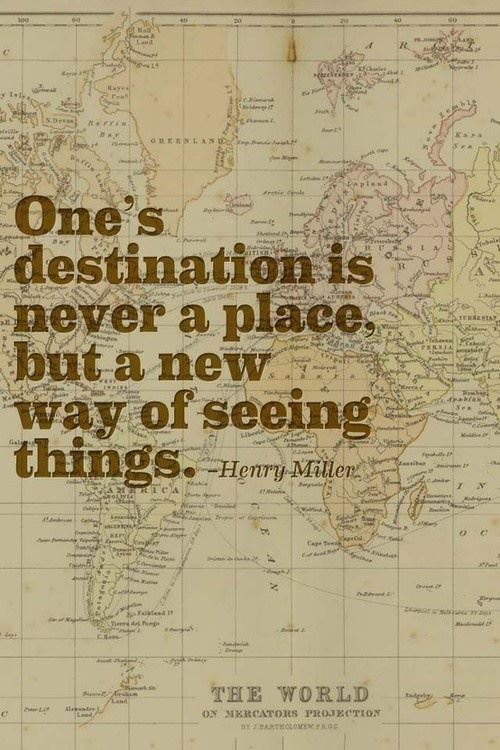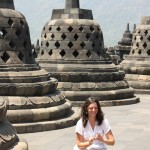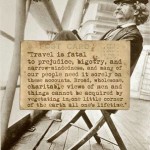It’s exactly today my 9 months anniversary of living in Indonesia. Time flies by.
I felt a bit afraid, afraid and excited, before first stepping foot here. I knew so little about Indonesia. My time was short to do any research on it and when I did have a little time I preferred to keep away form creating any prejudiced or stereotyped impressions from books or any media. Personal experience with an open heart and an open mind is always what I choose.
Flying here I had a 6 hour layover in Abu Dhabi. That was actually my first real contact with an Islamic country. Sitting just in the airport, observing the people. Further on, reaching Indonesia, I could just feel that the Muslims of Indonesia are different than the Muslims of the United Arab Emirates. Later I found out that there are some actual formal differences in the Muslim religion that each of these countries practice (the majority 99% of Muslims in Indonesia are Suuni, the Shias and Ahmadis are about 0.5% and respectively 0.2%). But I don’t plan to get into this one topic right now.
I wrote a keyword in the title, muslim, to draw attention, but the article is rather about humanity.
Islam is in Indonesia since the 13th century. It started gaining ground from the island of Sumatra, where we can still meet the most conservatory type of Muslims. It become the dominant religion by the 16th century. Now, it’s the most Muslim country in the world, with a declared percentage of 87.2% of the about 250 million population in 2010. Freedom of religion is actually declared and adopted in the Indonesian constitution, the government recognizing only 6 religions: Islam, Protestantism, Roman Catholicism, Hinduism, Buddhism and Confucianism. Most Indonesian Hindus are the Balinese and the most Buddhists are the ethnic Chinese. Each major celebration of each of these religions, such as Christmas, Catholic Easter, the Chinese New Year, the Balinese New Year, the Ascension day (that was quite surprising for me) etc.. is marked in the calendar with an official, government approved bank holiday.
What is interesting to note and what makes, I believe, the Muslims in Indonesia (and the followers of all the other declared religions) unique is that most of the population in Indonesia practices a less orthodox form of their religion, drawing from local customs and beliefs. Namely, one could say that Indonesians are quite animistic in their views upon life and the environment, which means that they believe in the existence of souls and spirits and that there is no separation between the spiritual and physical world, which applies not only to humans, but to some animals, plants, rocks, mountains or rivers.
I’ve spent most of my time here living in Java, mostly exploring Centra Java in the Yogyakarta Special Region and Surakarta, and having short term visits to Bali and the most recent short one in Sumatra. Everywhere people are different. I lived and traveled in cities and sub-urban areas, in rich places and in very poor ones, in urban and in deep country-side places. There were several things in common of all these people: their smile, their friendliness, their helpfulness and their warmth. As when it comes to their religion, I could just understand the most important function of it: creating community. Religion is a binder. It can also be a factor of separation if people resume to read the label only: “Muslim”, “Christian”, “Hindu” etc…
The fact is that there are Muslims and Muslims, Christians and Christians, Hindu and Hindu etc … Besides the animistic perspective, people add to their religion the most cherished values and socially acceptable behavior traits of the local community they belong to. Are there any extreme forms of each of these religions practiced? Yes, there are… Are there people that declare to belong to a certain religion but they don’t actually practice it? Yes, they are… Are there people that believe that their religion is the best and far better than any other? Yes, they are … Are there people that have changed their religion? Yes, there are. I met people who converted from Islam to Roman Catholicism, or people who converted from Buddhism to Christian Orthodoxy (that person was the one that surprised me the most, and challenged my beliefs, since I am a baptized and declared Christian Orthodox, but a Buddhist in my heart and soul)… Are there certain social norms and values that derive from the practiced religion? Yes, there are and people can be quite attached to it: such as the recommended way of dressing up, the way of addressing and behaving toward other people, how couples are formed and how should family life start and develop… Are there jobs that are given away to people that belong to a certain religion rather than the other? Yes, I heard of cases and I even read job ads that included in their description the required religion of the most suitable candidate.
Why do people choose a religion or the other and choose to behave in the way that is socially acceptable, as it is dictated by their religion and local community? I searched and observed and pondered and I eventually came to the answer that I believe is the best: people act based on either fear or on love to fulfill the universal individual needs of belonging (to a family/community), of being accepted and cherished, of creating (expressing themselves), of security (which includes the craving for peace and harmony).
In these 9 months, meeting, interacting with and observing not just Indonesians, but fellow colleagues and other friends from literally all over the world, I came to the conclusion that in essence: we are united by our needs but separated by how we express and satisfy them (much depending on our cultural background, education and personality traits); united by our love, but separated by our fears.
My life is completely changed after these 9 months, I just cannot return to looking at the world the same way I used to look at it before living in Indonesia. So this is how the quote below suits me so well:







